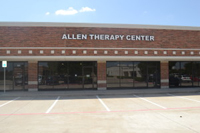Frozen shoulder, also known as adhesive capsulitis, is a condition that causes stiffness, pain, and limited range of motion in the shoulder joint. While it often develops gradually, it can have a significant impact on your daily activities, from getting dressed to lifting groceries. Fortunately, physical therapy is one of the most effective treatments for frozen shoulder—and at Plano Orthopedic & Sports Medicine Center (POSMC), we specialize in helping patients regain shoulder mobility safely and efficiently.
What Causes Frozen Shoulder?
Frozen shoulder occurs when the shoulder capsule—the connective tissue surrounding the joint—becomes thickened and inflamed. This leads to stiffness, reduced movement, and discomfort. It typically progresses in three stages:
-
Freezing Stage: Pain worsens and range of motion begins to decline.
-
Frozen Stage: Pain may subside, but stiffness remains.
-
Thawing Stage: Mobility slowly returns, sometimes over months or years.
How Physical Therapy Helps
Physical therapy is the cornerstone of treatment for frozen shoulder, especially in the early and middle stages. The goal is to gently stretch and mobilize the shoulder joint while minimizing pain and inflammation.
At POSMC, our experienced physical therapists work one-on-one with you to:
-
Reduce pain and inflammation
-
Improve shoulder flexibility and range of motion
-
Restore strength in surrounding muscles
-
Promote long-term joint health and function
What to Expect During Physical Therapy
Your treatment plan will be customized based on your symptoms, stage of frozen shoulder, and overall health. A typical program may include:
-
Manual therapy: Hands-on stretching and mobilization of the shoulder
-
Range-of-motion exercises: Gentle, progressive movements to improve flexibility
-
Strengthening exercises: Focused on the rotator cuff, scapula, and upper back
-
Home exercise plan: Daily routines to maintain progress between sessions
-
Heat and cold therapy: To relieve stiffness and reduce inflammation
Consistency is key. With regular sessions and commitment to at-home exercises, many patients see significant improvements within a few months.
When Is Physical Therapy Not Enough?
In more severe or advanced cases of frozen shoulder, physical therapy alone may not be enough. If pain or stiffness doesn’t improve after several months of conservative care, your orthopedic specialist at POSMC may recommend additional treatments such as:
-
Corticosteroid injections
-
Manipulation under anesthesia (MUA)
-
Arthroscopic capsular release surgery
Even in these cases, physical therapy remains essential before and after any procedure to maximize outcomes.
Trust the Shoulder Specialists at POSMC
At Plano Orthopedic & Sports Medicine Center, our team includes board-certified orthopedic surgeons and licensed physical therapists who specialize in treating shoulder conditions like frozen shoulder. Whether you’re in the early stages of adhesive capsulitis or recovering from surgery, we’re here to guide you every step of the way.
Take the First Step Toward Shoulder Relief
Don’t let frozen shoulder limit your life. Contact Plano Orthopedic & Sports Medicine Center today to schedule an evaluation and start a physical therapy program that gets results.
Call us or request an appointment online to begin your recovery.
Allen Physical Therapy Center
Contact Us Directly: 972-359-1288
 1223 McDermott Suite 50, Allen, TX 75013
1223 McDermott Suite 50, Allen, TX 75013
Phone: 972-359-1288
Fax: 469-281-2458
Hours: Monday-Thursday 7 a.m. – 7 p.m.
Friday 7 a.m. – 5 p.m.
